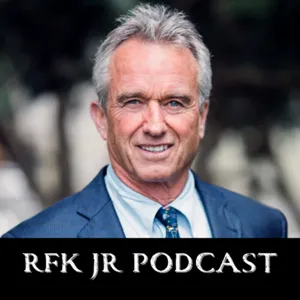ADHD vs. Other Clinical Considerations

Explore "early intervention" with insightful episodes like "ADHD vs. Other Clinical Considerations", "The Truth About ADHD in Adults: Harvard’s Dr. Chris Palmer Explains the Research", "Frontotemporal Neurocognitive Disorder", "Using AI to Combat Homelessness" and "Silencing Of Doctors Dr. Peter McCullough's New Book" from podcasts like ""Psychology Unplugged", "The Mel Robbins Podcast", "Psychology Unplugged", "Consider This from NPR" and "RFK Jr Podcast"" and more!


Have a hard time staying focused?
Do you start projects and never finish them? Are you frustrated with your hyperactive brain?
Your brain simply needs help, and today you’re going to learn exactly what to do about it, thanks to the expert advice of today’s guest Dr. Chris Palmer.
Dr. Palmer is a psychiatrist who has practiced at Harvard’s McLean Hospital, the #1 psychiatric hospital in the nation, for almost 30 years. He is also the Founder and Director of the recently launched Metabolic & Mental Health Program at McLean Hospital.
In this episode, you’ll also learn:
To listen to Dr. Palmer's first appearance on The Mel Robbins Podcast, check out the episode right before this one, Reset Your Mental Health: The Diet & Nutrition Protocol from Renowned Harvard MD
For more resources, including links to Dr. Palmer's work, studies, and tips to implement everything you learn, click here for the podcast resources page.
Listen to the episode about Mel’s deeply personal story of her own diagnosis of ADHD: 6 Surprising Signs of Adult ADHD
Follow Mel:




In this episode, Jordan B Peterson is joined by Richard Tremblay. Richard Tremblay is a Canadian child psychologist and Professor of Pediatrics, Psychiatry, and Psychology at the University of Montreal, where he holds the Canada Research Chair in child development. His research has focused on the development of aggressive behavior in children and the potential for early intervention programs to reduce the chances of children turning to crime in adulthood. In 2017, he received the 2017 Stockholm Prize in Criminology for his work studying delinquency in children, making him the first Canadian to receive this prize.
Dr. Tremblay and Jordan discussed a variety of topics in the realm of his research with physical aggression and juvenile delinquency, what surprised him of his finding, risk factors that lead to aggressive behavior in adults, experimental interventions with mothers to decrease aggression in children, the biology of aggression, what compelled him to do this research, different forms of aggression and more.


Ask an adult, especially if they're struggling in life, what caused them to end up the way they did, and they might cite certain factors from their childhood, like having a mother that was too cold.
The problem here, of course, is that memories change over time, and narratives about the past develop to fit one's current situation.
My guests today work on the kind of research that corrects this problem to figure out how aspects of childhood truly affect adulthood, by studying humans from the time they're babies through middle age and beyond. Their names are Jay Belsky and Terrie Moffitt, and they're professors of human development, and two of the four contributors to The Origins of You: How Childhood Shapes Later Life. To begin our conversation, Jay and Terrie discuss the longitudinal studies they and their colleagues have used to track people over decades of their lives, and how aggressiveness and shyness in childhood end up impacting adulthood. We then discuss the limitations of the famous marshmallow experiment, and what these more expansive longitudinal studies have shown about the importance of self-control in achieving a successful adulthood. We unpack whether the negative outcomes associated with being bullied in childhood are inevitable, who's most likely to become a bully, and who's most likely to be bullied (which as it turns out, isn't a matter of being fat or wearing glasses). We discuss how children who act out in childhood, but avoid making certain mistakes in adolescence, can still turn out okay, and why you probably shouldn't worry about children who were good kids, but get into a little trouble in their teen years. We also dig into the impact that childcare has on kids, and the role that genes play in development. We end our conversation with some allowance-related ideas for cultivating greater self-control in your kids.
Get the show notes at aom.is/childhood.

It wasn't exactly the trial of the century, but nearly everyone agreed - something had to be done.
Stay up to date
For any inquiries, please email us at hello@podcastworld.io